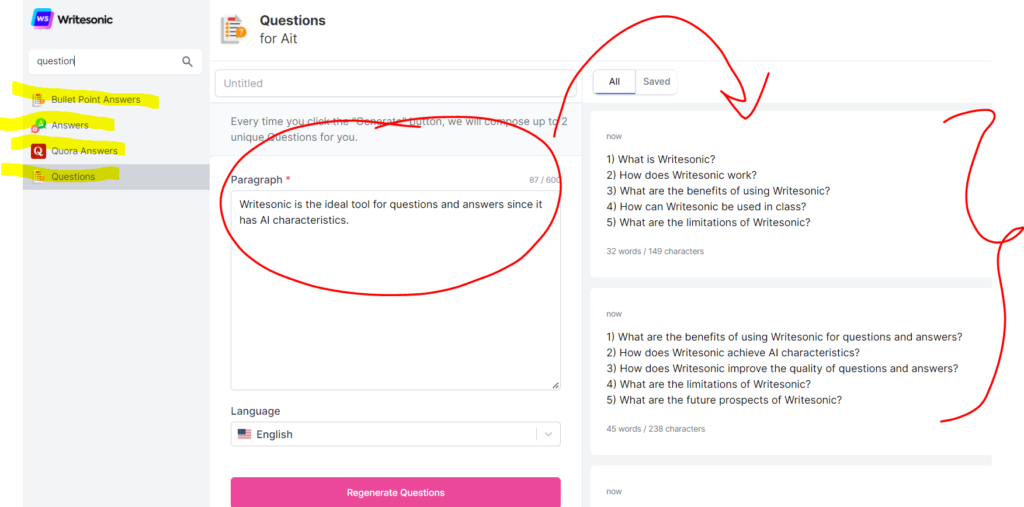
Looking for a question generator from a sentence, paragraph, or long text? Check out our selections for the best free online tools that convert text to questions.
One reason why these tools were so good is that they didn’t make us feel dumb when using them since they generated the right questions. All the answers, sentences, paragraphs, and text are used to generate the rest of the questions, so, any user may use them wherever they wish, such as in quizzes, articles, or even essays.
What Is It Question Generator?
A Question Generator from Text is a tool that automatically creates questions from a given piece of text. It can uses AI and natural language processing techniques to identify key information in the text and formulate relevant questions.
Why Using a Question Generator?
This tool is beneficial for educators creating quizzes, students seeking study aids, or anyone needing to extract essential questions from large texts quickly. It enhances learning and comprehension by focusing on critical aspects of the text.
How to Use a Question Generator?
To use a Question Generator, input your text into the tool. The tool then analyzes the text and generates a series of questions based on its content. These questions can range from simple factual queries to more complex, analytical ones.
What’s the Best Free Online Question Generator from Text
We took a look at different online resources and created a list of the best free online question-answer sites so that you won’t have to waste your time hunting for the perfect tool for your survey, blog post, essay, report, or college assignment.
Check out the top tools and makers to generate questions from texts, including Writesonic, Rytr, Quetab, Nichesss.
| Question Tool | Free Plan | Premium Plan Start Price | |
|---|---|---|---|
| 1 | Writesonic | 10k words/mo | $16/mo |
| 2 | Rytr AI | 10k words/mo | $9/mo |
| 3 | Quetab | 30 credits/mo | $9.99/mo |
| 4 | Nichesss | 30 days free trial (10k characters) | $19/mo |
1. Writesonic AI Question Generator from Paragraph

– Plans: Free for 10k words/mo, premium starts from $16/mo
Paragraph to Questions Generator
Writesonic‘s questions tool is an online sentence-to-question maker which will generate in-line or text-based questions based on your input.
- You can create questions based on any topic, sentiment, or person.
- It provides easy and instant results like the example.
Writesonic Questions Generator Specs:
- The Questions Generator is a part of the Writesonic content creation platform, which is designed to cater to all your content needs.
- Writesonic’s AI is trained on over 10% of the entire content of the Internet.
- The Questions Generator is just one of many interesting features that work similarly.
To get started, navigate to the “Questions” feature found in the menu options. Once there, take a moment to input your paragraph into the designated text area as indicated.
Then, be prepared to witness the magic in action as numerous, meticulously tailored questions are generated instantly, all in perfect harmony with the content of your paragraph.

How to use Writesonic to generate questions from sentences and paragraphs:
- To use the Questions Generator, you need to sign up for a Writesonic account. The platform offers a free trial of 10,000 word generations per month.
- Once you’re logged in, go to your dashboard and select the Questions generator feature.
- Enter a topic or keyword related to the content you want to create.
- The AI will generate a list of unique questions related to your topic that you can use to engage your audience.
- You can edit the questions as needed to fit your specific content needs.
Overall, the Questions Generator is a useful tool for content creators who want to engage their audience with unique and thought-provoking questions. It is easy to use and can be accessed as part of the Writesonic content creation platform.
- Other features: Writesonic offers features like AI Article & Blog Writer, Content Rephrase, Sentence Expander, Product Descriptions, ad copy generation for Facebook and Google Ads, Quora Answers, and customizable tools to tailor content.
A special Christmas & new year discount!
Get 20% off on Annual plans.
Simply, signup from here and use this discount code XMASNYWS20.

2. Rytr Question Generator

– Plans: Free for 10k words/mo, premium starts from $9/mo
Rytr’s Question Generator feature is a tool that uses artificial intelligence to generate questions from text or paragraphs. It applies machine learning and natural language processing to interpret the provided text and create relevant questions.
The generated questions can be multiple choice, true or false, open-ended, or fill-in-the-blank. To use the tool, you can follow these steps:
How to generate questions from answers, sentences, or paragraphs using Rytr AI

- Go to Rytr platform
- Choose use case – at this point clicking the dropdown in the box will present you with several tools that are available on the site. choose the question-and-answer option.
- Select language – At this point, one chooses the language that they would like to use in the question generation. This platform allows one to get services from over 20 languages.
- Select tone – next, one chooses the tone in which one would like the communication to be made. Some of the tone options would include, candid, shy, and many others.
- Add your text – this is where you key in the text from which you need the questions.
- Choose the number of variants you want.
- Choose the Creativity level.
- Click the “Ryte for me” button to generate the questions.
- The tool will generate for you the perfect and relevant questions from your text.
- Review and edit the generated questions as needed.
Overall, Rytr’s question generator feature can be useful for teachers and students to creating quizzes, study guides, and training materials, and can save time and enhance efficiency.
Other features: Rytr also boasts features such as an AI Writer, Rich Text Editor, Keyword Research tool, SERP Analysis, Image Generator, Outline & Brief Generator, Plagiarism Checker, Custom Use Cases, Automatic Reword/Expand/Improve capabilities, a Writing Profile, Team Collaboration options, and various Integrations.
3. Quetab Question From Text
Quetab is an AI-driven platform that offers a question generator among other tools to enhance skills.
– Plans: Free for 30 credits/mo, premium starts from $9.99/mo
Let’s run a test by pasting some text and pressing “start.”

See the generated questions results following the screenshot below.

4. Nichesss FAQ Question Generator

– Plans: Free trial of 30 days with 10k characters, premium starts from $19/mo
Unlike other software that allows you to add text directly for question generation, on Nichesss, one will have to log in to use it.
However once you have logged in, then you are good to go.
All you have to do is to upload the text from which you would like the questions and after that click the question generation button and there, you will have the questions and their answers set.
How to manually generate questions from a given text
Generating questions manually from a given text, sentence, or paragraph involves a few steps that focus on understanding the key information presented and framing it in a question format. Here’s a step-by-step guide to do this:
- Read and Understand the Text: First, thoroughly read the text to grasp its main ideas and details. Pay attention to who, what, where, when, why, and how aspects.
- Identify Key Points: Extract the most important points from the text. These could be facts, events, opinions, descriptions, or any significant information.
- Determine the Type of Questions: Decide what type of questions you want to create. They can be:
- Factual Questions: Focus on specific facts or details from the text.
- Inferential Questions: Ask about conclusions or inferences that can be drawn from the text.
- Analytical Questions: Involve analyzing or interpreting parts of the text.
- Application Questions: Ask how information from the text can be applied in different contexts.
- Formulate Questions:
- For Factual Questions, start with question words like Who, What, When, Where. For example, from a sentence about an event, you could ask, “When did the event take place?”
- For Inferential Questions, use prompts like “Why might…” or “What could be the reason…”
- For Analytical Questions, phrases like “What is the significance of…” or “Explain the relationship between…” can be used.
- For Application Questions, frame them like “How would you use…” or “What would happen if…”
- Keep the Questions Clear and Concise: Ensure that each question is straightforward and directly related to the text. Avoid ambiguity.
- Review and Revise: After creating your questions, review them to ensure they accurately reflect and relate to the text. Modify as needed for clarity and accuracy.
Remember, the goal of these questions is to probe deeper into the text and facilitate understanding, discussion, or analysis. They should challenge the reader to think critically about the material.
How to turn statements into questions in English
To change statements into questions in English. The process involves moving the auxiliary verb (also known as the helping verb) or the verb “to be” to the beginning of the sentence.
If the sentence does not contain an auxiliary or a being verb, then you use the appropriate form of “do” (do, does, did) at the beginning of the sentence.
Here’s a summary and examples based on the instructions:
With Helping Verbs: For sentences that contain helping verbs like “have,” “had,” or “will,” you move the helping verb to the start of the sentence.

With Being Verbs: For sentences that contain the verb “to be” in any of its forms (am, is, are, was, were), you move it to the start of the sentence.

With Do/Does/Did: For sentences that do not contain an auxiliary or being verb, you add “do,” “does,” or “did” at the beginning of the sentence depending on the tense and subject.

These rules help in converting declarative sentences into interrogative ones, which is a fundamental aspect of English grammar.
Let’s Q&A
What is a Question Generator from Text?
A Question Generator from Text is a digital tool that uses artificial intelligence to automatically create questions from a given piece of text. These tools typically employ natural language processing techniques to analyze the text and extract key points, generating relevant questions that can be used for educational, professional, or personal purposes.
Who can benefit from using Free Text-based Question Generators?
Free Text-based Question Generators are particularly beneficial for educators, students, content creators, and researchers. Educators and students can use them to create study guides and quizzes, while content creators and researchers can utilize them to generate questions for engaging articles, interviews, or data analysis.
Are these Question Generators user-friendly for beginners?
Yes, most of these Question Generators are designed with user-friendliness in mind, catering to both beginners and advanced users. They typically feature a simple interface where users can input text and receive a list of questions, making them accessible and easy to use regardless of technical expertise.
How accurate are the questions generated by these tools?
The accuracy of questions generated by these tools largely depends on the quality of the input text and the sophistication of the tool’s AI algorithms. Generally, they are quite accurate in identifying key points and generating contextually relevant questions, but they may require user review for precision and relevance.
Can these tools generate questions in multiple languages?
Many advanced Question Generators from Text offer multilingual support, allowing users to input text and receive questions in various languages. This feature enhances their usability for a global audience and makes them suitable for multilingual educational and content creation purposes.
Are there limitations to the types of text these tools can process?
While Question Generators from Text are versatile, they may have limitations with extremely technical, ambiguous, or niche-specific texts. They work best with well-structured and clearly articulated texts, as these allow the AI to accurately identify key information and generate relevant questions.
How do these tools enhance educational and learning experiences?
These tools enhance educational and learning experiences by enabling quick and efficient generation of study questions, aiding in comprehension and retention of information. They encourage active learning and critical thinking by prompting learners to engage with the text more deeply.
Can these Question Generators be integrated with other educational tools?
Many of these Question Generators can be integrated with other educational tools and platforms, such as Learning Management Systems (LMS) or content creation software. This integration streamlines the process of creating educational materials and quizzes, making it more efficient and cohesive.
Is there a cost associated with using these Question Generators?
While many Question Generators from Text offer free versions, they may have limitations in terms of usage or features. Premium versions are typically available, providing more advanced features, greater capacity, or enhanced customization options for a fee.
How do these tools ensure the privacy and security of the input text?
Most reputable Question Generators from Text prioritize user privacy and data security. They typically employ various security measures, such as encryption and secure data storage, to protect the text input by users and ensure that it is not misused or accessed without authorization.
